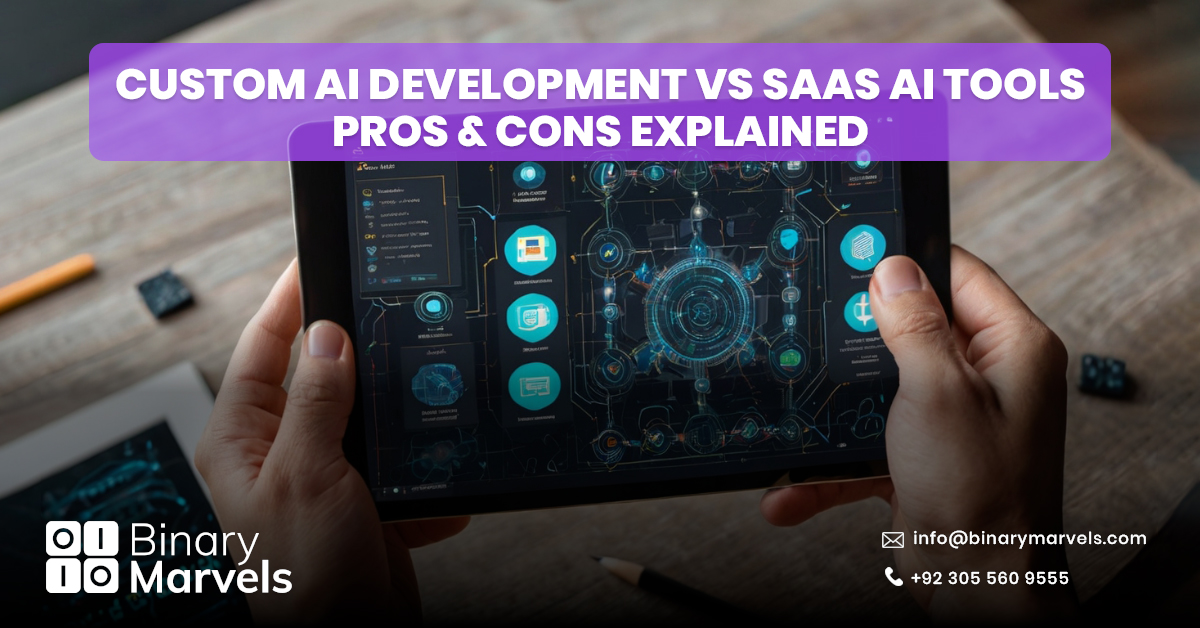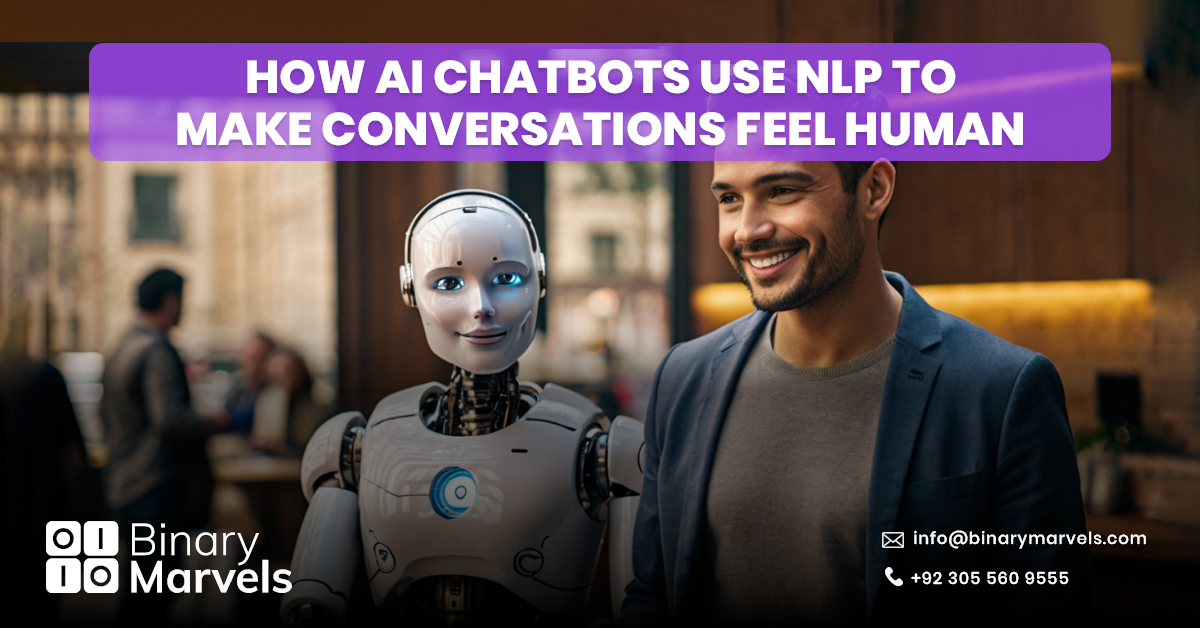
Is your business trying to decide between building a custom AI solution or using a ready-made SaaS AI tool? With AI becoming a game-changer across industries, choosing the right approach can directly impact your scalability, efficiency, and long-term ROI. Some businesses need full control over data and algorithms, while others prefer quick, cost-effective tools that work out of the box.
In this guide, we’ll break down the key differences, pros, and cons of Custom AI Development vs SaaS AI Tools to help you make an informed decision based on your goals, budget, and resources.
Also Read: Top 10 AI Companies in Pakistan
What Is Custom AI Development?
Custom AI development refers to building artificial intelligence solutions specifically tailored to a business’s unique requirements. Instead of using pre-built tools, companies create models, algorithms, and systems designed around their data, workflows, and goals.
This approach often involves working with AI developers, data scientists, and machine learning engineers to craft solutions that can handle complex, industry-specific tasks such as fraud detection in finance, personalized treatment plans in healthcare, or demand forecasting in supply chain operations.
Custom AI offers complete control over functionality, scalability, data privacy, and performance, making it ideal for enterprises with long-term AI strategies or specialized use cases. However, it usually requires a larger investment in time, expertise, and budget.
What Are SaaS AI Tools?
SaaS AI tools are cloud-based applications that offer artificial intelligence capabilities as a service. These tools are developed, maintained, and hosted by third-party providers, allowing businesses to access advanced AI features without building them from scratch.
Popular examples include ChatGPT for conversational AI, Jasper for content generation, and Salesforce Einstein for predictive analytics. Users typically pay a monthly or yearly subscription fee to access these tools.
SaaS AI is ideal for businesses that need fast deployment, lower upfront costs, and minimal technical setup. These tools are especially useful for common use cases like customer support automation, marketing content generation, or data analysis. However, they often have limitations in terms of customization, data control, and scalability for complex enterprise needs.
Also Read: 7 Mistakes to Avoid When Choosing an AI Development Company
Key Differences Between Custom AI and SaaS AI
Choosing between custom AI development and SaaS AI tools depends on several critical factors, including budget, scalability, control, and time to market. Below is a side-by-side comparison to help you understand how the two approaches differ:
| Feature | Custom AI Development | SaaS AI Tools |
|---|---|---|
| Cost | High initial investment | Subscription-based, affordable |
| Deployment Time | Longer, depends on complexity | Instant access after sign-up |
| Flexibility | Fully customizable | Limited to available features |
| Data Ownership | Full control of your data | Data often stored by the provider |
| Scalability | Built to fit specific scaling needs | Scaling may depend on plan limits |
| Maintenance | Requires in-house or external team | Maintained by the SaaS provider |
| Integration | Deep integration with existing tools | May require third-party connectors |
Pros and Cons of Custom AI Development
Custom AI development offers powerful advantages for businesses looking for tailored solutions, but it also comes with its own set of challenges. Here’s a detailed look:
Pros
1. Full Customization
Custom AI can be built to fit your exact business needs, workflows, and goals, providing a solution that aligns perfectly with your operations.
2. Complete Data Control
You maintain full ownership and control over your data, which is crucial for industries with strict privacy or compliance requirements.
3. Competitive Advantage
Tailored AI can give you a unique edge by solving problems that off-the-shelf tools can’t handle.
4. Scalable Architecture
Custom-built AI systems are often designed to scale with your business, supporting growth without performance issues.
Cons
1. High Development Costs
Building a custom AI solution requires significant investment in development, infrastructure, and talent.
2. Longer Time to Market
Custom AI typically takes weeks or months to build and test before it’s ready for deployment.
3. Requires Technical Expertise
You’ll need access to skilled AI developers, data scientists, and project managers to build and maintain the system.
4. Ongoing Maintenance
Once deployed, custom AI solutions need regular updates, monitoring, and support, which adds to the total cost of ownership.
Also Read: DeepSeek AI vs. Gemini: Which AI is the best choice?
Pros and Cons of SaaS AI Tools
SaaS AI tools are designed to be easy to use and accessible, especially for businesses that need fast results without heavy technical investment. Here’s a breakdown of the benefits and limitations:
Pros
1. Fast Deployment
Most SaaS AI platforms are ready to use immediately after signup, making them ideal for quick implementation and short-term projects.
2. Lower Upfront Cost
With a subscription-based model, businesses can access advanced AI features without large initial investments.
3. No Maintenance Burden
All updates, security patches, and system improvements are handled by the provider, freeing up internal resources.
4. User-Friendly Interfaces
These tools are built for ease of use, often requiring little to no coding experience, making them accessible to non-technical teams.
Cons
1. Limited Customization
SaaS AI tools are built for general use cases and may not align perfectly with your specific business requirements.
2. Data Privacy Concerns
Your data is often stored and processed by third-party providers, which can raise compliance and security concerns.
3. Feature Restrictions
You are limited to the features offered by the provider, and advanced capabilities may only be available in higher-tier plans.
4. Vendor Lock-in
Switching providers or integrating tools across platforms can be difficult once your processes are tied to a specific SaaS ecosystem.
When Should You Choose Custom AI Development?
Custom AI development is the right choice when your business needs go beyond the capabilities of pre-built solutions. Here are scenarios where a custom approach makes the most sense:
1. Unique Business Processes
If your workflows, goals, or industry requirements are highly specific, custom AI allows you to build solutions that align exactly with your needs.
2. Data Sensitivity and Compliance
Businesses in healthcare, finance, or government sectors often require strict data control. Custom AI ensures your data stays secure and compliant with regulations.
3. Long-Term Scalability
Custom-built AI systems can be designed to scale seamlessly as your business grows, providing a future-proof solution.
4. Competitive Differentiation
If you aim to gain a strategic edge through innovation, custom AI can deliver unique capabilities that competitors using generic tools won’t have.
5. Integration with Legacy Systems
When your operations rely on older or specialized software, a custom AI solution can be tailored to integrate smoothly without disrupting your existing infrastructure.
Also Read: Top 10 Reasons to Hire a Dedicated AI Development Team in 2025
When Are SaaS AI Tools a Better Fit?
SaaS AI tools are ideal for businesses that want to start using AI quickly, without the need for extensive development or technical expertise. Here are situations where SaaS AI tools are the smarter choice:
1. Budget Constraints
If you’re a startup or small business with limited resources, SaaS tools offer a cost-effective way to access AI features without heavy investment.
2. Quick Implementation Needed
When time-to-market is critical, SaaS AI platforms allow you to launch and test AI-powered features almost immediately.
3. General Use Cases
For common tasks like content creation, email automation, or customer support chatbots, SaaS tools usually offer more than enough functionality.
4. No In-House AI Expertise
If you don’t have a technical team to build and maintain AI systems, SaaS platforms come with pre-built models and support, making them easy to use.
5. Flexibility to Experiment
SaaS AI tools are great for testing ideas or running MVPs before deciding whether to invest in a custom solution later on.
Hybrid Approach: Combining Custom AI with SaaS AI
In many cases, the best solution isn’t choosing between custom AI and SaaS AI—it’s combining both. A hybrid approach allows businesses to leverage the speed and affordability of SaaS tools while integrating custom-built AI components for more advanced or specialized needs.
For example, you might use a SaaS tool for natural language processing while developing a custom recommendation engine tailored to your customer data. This allows your team to stay agile, experiment faster, and still build strategic AI capabilities where it matters most.
A hybrid model also supports smoother scaling. You can start with SaaS for rapid deployment and shift to custom solutions as your business grows and your needs become more complex. This balance helps manage costs, optimize resources, and reduce risk while gradually building your AI maturity.
Supercharge Your Business with AI Today!
As a trusted AI Development Company in Pakistan, we deliver cutting-edge AI Development Services designed to streamline your operations and enhance customer engagement.
Don’t wait—connect with us now and take your business to the next level!
Conclusion
Choosing between custom AI development and SaaS AI tools depends on your business goals, technical capabilities, timeline, and budget. If you need a highly tailored solution with full control over data and performance, custom AI is the better fit. On the other hand, if you’re looking for a fast, cost-effective way to start using AI without deep technical involvement, SaaS tools are a smart choice.
Many businesses also find success in combining both approaches—using SaaS tools for standard tasks and developing custom AI for more strategic or complex needs. By carefully evaluating your priorities and resources, you can choose the AI strategy that delivers the best value and long-term results for your organization.
FAQs
What is the difference between Custom AI Development and SaaS AI Tools?
Custom AI is built from the ground up to meet specific business needs, while SaaS AI tools are ready-made platforms that offer general AI features via subscription.
Which option is better for small businesses?
SaaS AI tools are usually more suitable for small businesses due to their lower cost, faster setup, and ease of use.
Can SaaS AI tools be customized?
Some SaaS AI platforms allow limited customization, such as adjusting workflows or training basic models, but they can’t match the flexibility of custom-built solutions.
How long does custom AI development take?
Depending on complexity, custom AI can take anywhere from a few weeks to several months to design, develop, and deploy.
Is SaaS AI secure for sensitive data?
While many SaaS providers offer strong security features, storing data on third-party servers can raise privacy and compliance concerns for certain industries.









